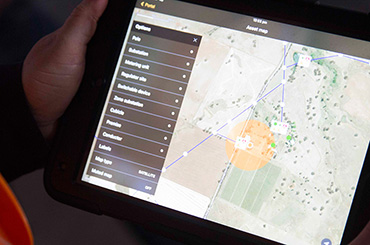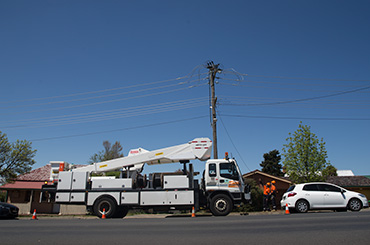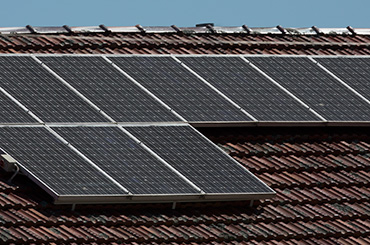
Essential Energy installs, operates and maintains power poles, powerlines and other electrical assets required to safely bring electricity to homes, businesses and anywhere power is needed. To bring the power to you, we install and maintain the network up to the connection point on your property. After this connection point, any power poles, powerlines and other electricity assets are your property which you are responsible for maintaining, in the same way you look after the wiring in your home.
When we refer to private poles, it incorporates all of the components of a private network – that includes the power pole, the overhead powerlines or underground wires, crossarms and any other associated equipment and fittings.
What is the connection point?
The connection point is the point where Essential Energy’s network joins your network. The diagram (below) gives a simple explanation of a connection point. In a rural area, the connection point is the first pole on your property.

What are private assets?
In some cases, properties need to have private poles to bring the power from the Essential Energy electricity network to where it’s needed; in these cases, the connection point is located before these private poles, which means they are your property and are your responsibility to maintain.
View our most common types of private poles in different configurations
Check for hazards
Private poles and overhead powerlines should be regularly inspected and properly maintained by qualified contractors. If you notice any of these common defects, you will need to organise repairs or tree trimming as soon as possible. For full details on planting guidelines and clearance distances, visit essentialenergy.com.au/trees.
- Trees near powerlines
- Vegetation growing inside the minimum safe clearance is more likely to come into contact with live powerlines and interrupt supply or start a fire.
- Clashing powerlines
- Powerlines that clash in high winds can spark and produce molten fragments, which may cause bushfires.
- Slack wires
- Powerlines or wires hanging too low can clash and lead to bushfires. Low wires may also breach minimum height safety requirements.
- Rotting poles
- All poles should be inspected above and below the ground for deterioration. Rotting or rusting below ground can cause poles to lean or fall down.
- Split or damaged poles can fail and break in storm conditions or over time.
If you have a private pole, what are your responsibilities?
You must ensure that the network components you own are safe and properly maintained.
Essential Energy expects you to organise your own regular inspections:
- annually, before each bushfire season
- after major storms, or
- if you suspect any damage.
This may include:
- organising a licensed electrician to regularly inspect, maintain and, where necessary, promptly repair electricity equipment including power poles, wires and pole-top fittings on your property, also include any sub-mains on the property that may provide power supply to a pump or a shed and;
- engaging a qualified tree trimming contractor to maintain safe clearances between trees and power poles or powerlines.
Important safety information
Always stay at least eight metres away from a fallen powerline, objects in contact with wires, or a low hanging powerline.
Do not touch the line or object in contact with it. Always assume it is live and report any immediate safety hazards on the electricity network or privately owned poles and powerlines on 132080 as soon as possible.
Also stay away from anything that may be in contact with the line, such as fences or trees, as they are conductors of electricity. Be aware that electricity can arc to surrounding objects and you if you are too close. You can be seriously injured without touching the powerline. For more safety information visit essentialenergy.com.au/safety
Private power poles must be properly maintained to ensure that they do not pose a serious bushfire hazard or a significant electrical safety hazard to your property, the broader community and Essential Energy’s employees.
What are Essential Energy’s rights?
Provisions under the Electricity Supply Act 1995 and Electricity Supply (Safety and Network Management) Regulation 2014 allow Essential Energy’s asset inspectors to access your property to undertake regular ground-based patrols of your privately-owned power poles and overhead powerlines. Essential Energy generally does not inspect privately-owned sub-mains – the low voltage overhead powerlines that extend beyond your main switchboard or metering unit. We may inspect some sub-mains beyond the main switchboard or metering unit that are in a continuous overhead line from Essential Energy service mains, or aerial consumer mains that are visually obvious to the inspector.
If a defect is identified, Essential Energy will send you notification of the work required to rectify this and the timeframe in which it must be done.
Essential Energy can disconnect part or all of the installation if an unsafe situation is detected and not rectified in a timely manner. Essential Energy can also complete defects within a Bushfire Prone area and recover costs.
How will I know if there are defects on my network assets?
The qualified professionals you engage will advise you of any issues and appropriate rectification procedures.
Additionally, if our asset inspectors or field staff identify any hazards or defects associated with your private power poles or overhead powerlines, we will send you notification of the work required to rectify this and the timeframe in which it must be done. Find out more about defect notices
What typically results in a defect notice?
Defect notices for overhead consumers’ mains often relate to trees or branches growing too close to your privately-owned power poles and powerlines, frayed wires or other faults on your installation, or alterations or additions to existing connections which do not meet the necessary safety standards. Power poles in poor condition and at risk of collapse may also be identified in a defect notice.
You must notify us in writing when all identified defects have been rectified.
What are a property tenant’s or manager’s responsibilities?
If you are a tenant or manager, you should notify the property owner or rental agency immediately if you think that a power pole or powerline on the property requires maintenance or repair. You should also forward any defect notices to the property owner or the rental agency as soon as possible.
Please contact Essential Energy on 02 6589 8860 if you are unable to contact the property owner or rental agency, or if the property owner or rental agency does not take prompt action to ensure the pole or powerline is restored to safe, serviceable condition.
Further information
Privately-owned power poles and powerlines brochure
Frequently Asked Questions
Information about defect notices
Customer Support Policy



